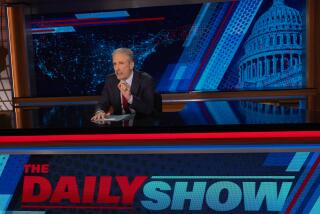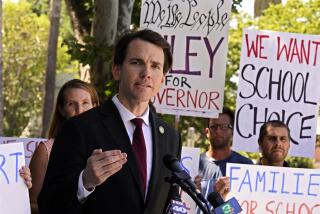Stephen Colbert appears before FEC, with some serious business
Satirical talk show host Stephen Colbert took his act to the Federal Election Commission on Thursday, shining his lights — literally — on the normally obscure bureaucracy.
Colbert had petitioned the three Republicans and three Democrats on the commission to give their blessing to a political fundraising organization the comedian decided to form last spring.
Packing cameras and spotlights, the team from Comedy Central’s “The Colbert Report” showed up to hear the commission debate whether Colbert should be allowed to form a corporate-backed political action committee — Colbert Super PAC — and use the resources of parent company Viacom to produce and air election-related ads.
Colbert’s proposal, jocular though it may be, raised the potentially serious prospect that other television personalities might seek to create similar fundraising groups, with questions centering on how much they would be required to disclose about their employers’ involvement.
In an unusual display of bipartisanship, the commission delivered a swift and nuanced answer, easing concerns among many campaign finance experts that what started as a skit might end up going too far.
By a 5-1 vote, the commission said Colbert could form his PAC, through which he says he plans to produce and air ads advocating for or against specific candidates. But if he wants to air the ads outside “The Colbert Report,” he will have to disclose the value of any Viacom resources — studio time, equipment or his staff’s time — that go into creating the ads.
That wasn’t the full freedom from disclosure that Colbert had sought, but that didn’t stop him from casting the decision as a victory.
“The FEC made its ruling, and I’m sorry to say, we won!” Colbert announced to a crowd of hundreds outside FEC headquarters.
“Some have cynically asked if this is some kind of joke,” Colbert told the crowd. “But I don’t think that participating in democracy is a joke. I don’t think that wanting to know what the rules are is a joke.”
Commission members did not take Colbert’s request as a prank.
“If we’d viewed this as just a funny request, then that actually would have been a lot easier,” Commissioner Ellen Weintraub told Colbert at the hearing, noting that shows such as “Saturday Night Live” broadcast parodies that are clearly not subject to campaign finance rules.
Colbert’s request illustrates just how “complex, convoluted and ultimately stifling of political speech our campaign finance system is,” said Sean Parnell, president of the Center for Competitive Politics, a group that opposes campaign finance limits.
In requesting a “press exemption” to disclosure rules, Colbert suggested that the cost of producing and airing the PAC’s ads falls under the media function of “The Colbert Report.”
If the commission had agreed, it could have opened the door for politicians with TV contracts to form super PACs and to tap into the resources of media companies — without disclosing their involvement. Instead, the commission reached a compromise.
“Suppose a serious media personality, like a Keith Olbermann or a Sarah Palin, wanted to use this advisory opinion to set up something serious,” said Richard Hasen, an election law professor at UC Irvine. “Any money that would come from the parent company broadcasting the show now has to be disclosed. It will not be treated as exempt.”
The topic of disclosure has been a contentious one at the FEC since a Supreme Court ruling in January 2010 erased previous limits on corporate and union spending to influence elections. In the past, the commission has deadlocked on questions of disclosure. Not this time.
“Part of the reason they didn’t deadlock here is that they knew they were going to get so much more attention than they ever get,” Hasen said.
In addition to fostering compromise, Colbert’s appearance energized the normally sleepy goings-on at the FEC.
“I woke up this morning and watched last night’s ‘Colbert Report’ on Hulu. And I thought, ‘Oh my God, we’re in Washington!’ ” said Caitlin Doorbos, a 19-year-old student at the University of Kansas who is interning in the capital.
After addressing the crowd, Colbert whipped out an iPad and began swiping credit cards to collect donations.
More to Read
Start your day right
Sign up for Essential California for news, features and recommendations from the L.A. Times and beyond in your inbox six days a week.
You may occasionally receive promotional content from the Los Angeles Times.







